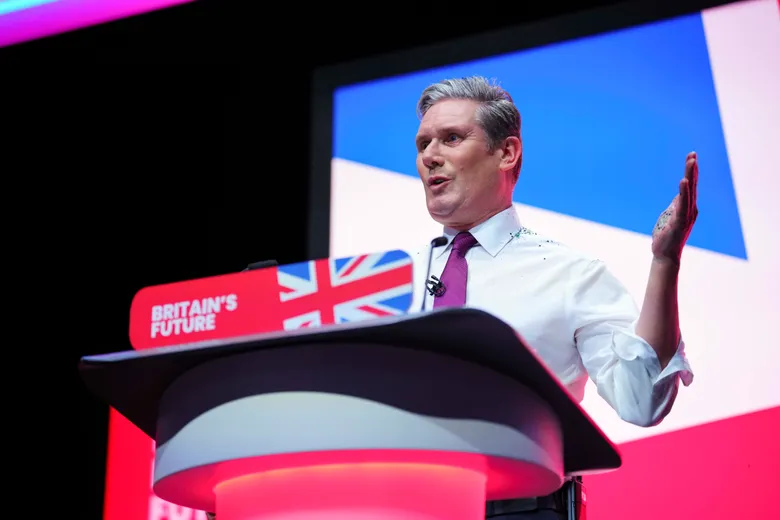
U.K. Labour Party leader Keir Starmer delivered a speech on Tuesday that amounted to a public job interview for the post of prime minister, promising to restore Britain’s battered institutions and end an “age of insecurity” afflicting its people.
Starmer told the opposition party’s annual conference, likely the last before a national election, that a Labour government would launch “a decade of national renewal,” after what he depicted as 13 years of decline under the Conservative Party.
“It’s been 13 years now and what does Britain have to show for it?” he asked in the televised address. Starmer accused the Conservatives of ushering in “a time when our politics feels broken, when our public services are broken, our public finances wrecked.”
But he added: “What is broken can be repaired, what is ruined can be rebuilt” with an ambitious program of building, investment and reform.
Starmer’s speech in Liverpool at a conference that has been overshadowed by violence in Israel and Gaza was a key moment for a politician who has managed to unite a fractious party and gain a substantial lead in opinion polls but remains a blank slate to many voters.
Labour has lost four straight national elections, and the most recent, in 2019, delivered the party’s worst result since 1935.
Much has changed since then. Britain has been through the COVID-19 pandemic, left the European Union and absorbed the economic shock of Russia’s invasion of Ukraine, all of which pushed the inflation in the U.K. above 11% late last year.
Voters are weary from a cost-of-living crisis, a wave of public sector strikes and political turmoil that saw the Conservative Party dispatch two prime ministers last year — Boris Johnson and Liz Truss — before installing Prime Minister Rishi Sunak to try to steady the ship.
With an election due by the end of 2024, polls put Labour as much as 20 points ahead of the Conservatives.
Since his election as Labour’s leader in 2020, Starmer has steered the social democratic party back toward the political middle ground after the divisive tenure of predecessor Jeremy Corbyn, a staunch socialist who advocated nationalization of key industries and infrastructure.
Starmer also repaired relations with Britain’s Jewish community and vowed to root out antisemitism that’s alleged to have tainted the party under Corbyn, a strong supporter of the Palestinian cause. Starmer condemned the weekend attack by “the terrorists of Hamas” and said Israel “has the right to defend her people.”
His move to the economic center has alienated some grassroots Labour members who want a bolder agenda. Starmer argued that Labour has to stand up for working people while also working with businesses.
“Fiscal responsibility is non-negotiable,” he said, promising that Labour would “work hand in glove with the private sector to rebuild this country.”
In a sign that corporate Britain is warming to Labour, companies thronged to the conference in The Beatles’ birthplace of Liverpool, buying space in the exhibition hall, sponsoring panel discussions and attending a business forum with party leaders.
Delegates roared their approval even when Starmer led them onto uncomfortable ground by saying that the U.K.’s state-funded National Health Service, which Labour founded and still reveres, is in need of major reform. He also urged disillusioned Conservative voters to embrace the party, saying Labour was the true custodian of family life, the rule of law and the environment.
Party members gave Starmer a standing ovation as he took the stage — and an even bigger one after a protester affiliated with environmental group Just Stop Oil rushed up and showered him with glitter, shouting: “True democracy is citizen-led.” The protester was bundled off and Starmer continued his speech after removing his suit jacket.
Police said a 28-year-old man was on suspicion of assault, breach of the peace and causing public nuisance.




